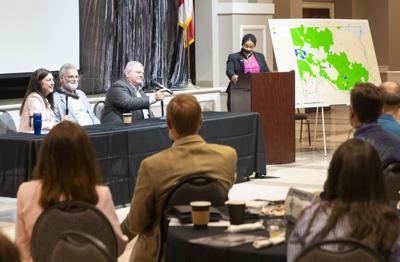Internet connectivity was something in only the movies a few decades ago.
Now computers, televisions, phones, businesses and homes have a requirement only thought of in The Jetsons — broadband internet access. The requirement of broadband is reminiscent of the need of another utility.
“If you don’t have it in a community, you will not survive,” Central Alabama Electric Cooperative CEO Tom Stackhouse said. “The communication connection now is critical. It is as critical now as when people needed electricity 70 and years ago. It is a big part of the infrastructure now and is really needed.”
CAEC owns broadband provider Central Access. The two entities provide electricity and internet service to Elmore, Autauga, Chilton and Coosa counties.
CAEC joined the internet service provider segment out of necessity. It had six officers and two dozen substations and needed communication between them all. It looked outside of the coop to find a provider.
“We realized we can’t communicate and that is where our members are,” Stackhouse said. “If members can’t get communication, that is why they aren’t living on the family farms like they used to. They are beginning to move away.”
Elmore County commissioner Bart Mercer said communication, in particular broadband access, is crucial for rural areas to survive.
“Broadband is as important as water,” Mercer said. “We feel everybody needs to have access.”
Mercer said broadband access affects where homes are built and businesses are located.
“It can limit access to a proper education,” Mercer said. “It could limit access to telemedicine. We really saw it in 2020 when COVID shut things down. It became more obvious how broadband access and lack of it can affect the local economy.”
Even before the COVID-19 pandemic CAEC was able to create Central Access to not only serve its needs but that of the community. At the time an estimated 35% of Elmore County was either underserved or unserved in terms of broadband access. In building out the system Central Access was able to provide broadband access to many of its customers along the way, about 10,000 of CAEC’s nearly 48,000 services. Within that original core, more than 50% of the CAEC customers with the ability to get Central Access have it.
Elmore County was ahead of the curve in serving broadband as students were sent home in March 2020 for the pandemic. But a foundation was laid and county leaders, educators and Central Access were able to put a plan together to deliver broadband thanks to knowing where broadband access points were on a map and laying over a bus route map from the Elmore County Board of Education. Leaders also had a map of already established hotspots. Within a few hours it was determined locations for 25 hotspots across the county could easily be installed to allow the required at-home learning.
At the same time Montgomery County installed fewer than 10 hotspots.
The groundwork was laid in 2017 when the county and the Elmore County Economic Development Authority (ECEDA) conducted a broadband accessibility survey. Just because Elmore County had identified broadband access deficiencies, it couldn’t solve the problem.
“Broadband infrastructure is not owned by the government,” Mercer said. “It is owned by non-governmental entities such as a co-op like Central Access or Spectrum, a private business. We couldn’t affect positive change directly. We had to partner with other people to do it.”
Early on, the county could be only a cheerleader. It couldn’t spend funds on broadband access or many other things.
The county provided backup by passing resolutions supporting businesses such as Central Access and Spectrum to apply for federal broadband access grants.
Recent legislation changes now allow local governments to help. In the last year the Elmore County Commission cut out years of red tape to help supply backup fiber to the facilities of the Elmore County Board of Education.
For eight days in the fall of 2023 Elmore County Schools lost internet access. It was a huge hiccup as many of the current education methods require internet access.
In the process of Central Access extending fiber to the schools, it has allowed more Elmore County residents to gain access to broadband.
“We are slowly but surely able to reduce to about 17% [in Elmore County] that are unserved or underserved,” Mercer said.
Currently Elmore County is trying to be strategic where it spends money on broadband. There are numerous grants ISPs can apply for. In the case of the county schools, the county covered a portion of the costs to allow Central Access to build out the system in less than a year after the school internet outage. The grant process is far longer.
It’s those partnerships ECEDA director Lisa Van Wagner is concentrating on, especially broadband access since it's a requirement in every economic development deal.
“Everyday I work on broadband,” Wagner said. “I have about 30 other projects and broadband takes up the majority of ECEDA’s time.”
Mercer serves on a national committee of county commissioners broadband task force. The main topic is broadband access. In Alabama, Elmore County is ahead of the curve but the county’s efforts are also garnering attention nationally through a broadband report from the National Association of County Commissions. It highlighted how leaders seek partnerships to pull projects together.
“It has taken a group of people to get us where we are,” Mercer said. “Our broadband hotspot program was one of the featured programs in the report. We still continually seek out partnerships to better serve the county.”


